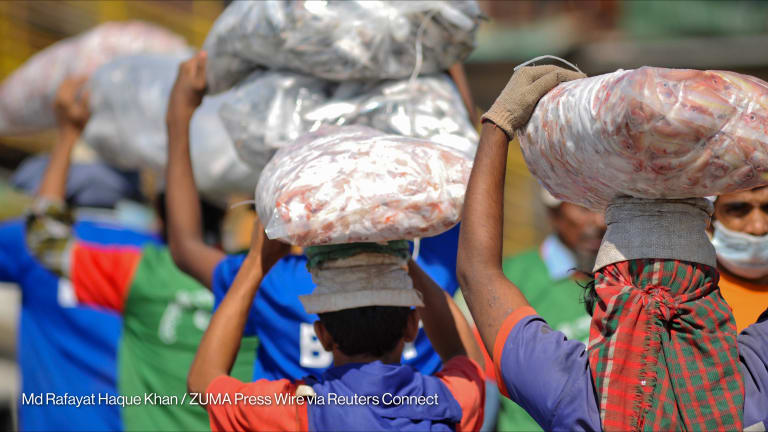
Coconut is big business. In less than 10 years, demand for coconut products has skyrocketed. The coconut water industry, for example, is now worth more than $1 billion.
Yet very little of the rewards have trickled down to smallholder farmers in coconut producing countries. While American consumers pay $1.50 to $2 for a serving of coconut water, farmers receive just 11 cents to 20 cents per nut.
In the face of booming popularity for their products, coconut farmers remain the poorest in the Philippines — one of the top coconut-producing countries in the world. In fact, nearly 60 percent of the 3.5 million coconut smallholder farmers in the Philippines live in poverty.
Challenges coconut farmers face
Owing to its proximity to the sea, the Philippines is extremely susceptible to natural hazards, which pose significant risk to the national economy and to the livelihoods of the most vulnerable populations. On average, eight or nine tropical storms make landfall each year, according to PAGASA, the government meteorological agency. Typhoon Haiyan decimated 1.1 million tons of crops, including 33 million coconut trees, and wiped out the productive assets of coastal families that depend on agriculture, including coconut farmers.
Smallholder coconut farmers are among the least resilient to environmental and economic shocks, including natural disasters, global market volatility and crop failure. Their ability to build assets and mitigate risk is severely constrained because they are excluded from the formal financial sector, are prone to cycles of low productivity and face high levels of indebtedness. They also lack income diversification and market options.
This is compounded by the fact that coconut farmers have little or no access to information or the advisory and financial services they need to maximize their farm returns and reduce vulnerability.
Providing services to “last mile” farmers has long been a challenge due to the high transaction costs associated with serving a dispersed, remote clientele. These challenges, combined with lack of farm-level data, make it difficult to evaluate farmer risk and serve farmers profitably.
Grameen Foundation has worked in the Philippines with financial institutions and technology organizations that work with the poor for over a decade. We believe focusing on four key areas will help coconut farmers achieve household resiliency and greater economic security.
1. Provide mobile-enabled agricultural advice to assist farmers in building assets.
Given the high penetration rates in the Philippines, mobile phones offer a cost-effective way to deliver agricultural advice to farmers, especially those working in more remote areas. Better farming practices can help coconut farmers increase productivity and earn higher revenue — and insulate them against market fluctuations, while promoting greater food security. Through the Global Resilience Challenge, we will leverage a suite of mobile services to support better adoption of best practices.
2. Enable risk diversification through access to markets.
Diversifying farmers’ income sources is also important to help improve household resilience. Working with global and local partners, including global superfoods brand Nutiva and local cocoa agribusinesses, we will use a market-based approach to promote access to resources that enable farmers to intercrop cacao with coconut. At the same time, we will link farmers to markets that reward them with higher prices and reduce the informal debt cycle that erodes their asset base.
3. Increase access to insurance and financial services.
Coconut farmers need access to appropriate financial services to reduce their risk exposure and invest in their farms. Working with the public and private sector, we will link coconut farmers to tools that insure their farms against natural disaster and crop failure. We will also explore how mobile phones can be used to increase access to services and reduce the cost of service delivery.
4. Leverage mobile technology and geospatial data to mitigate pest and disease risk.
Combining mobile technology and farm-level satellite data offers an unprecedented opportunity to tackle pest and disease outbreaks before they destroy farms and local economies. Mobile phones enable real-time, cost effective two-way data flows that provide a greater depth of information that can be acted on more immediately. Mobile alerts enable early outbreak detection and allow farmers to connect to government resources to minimize losses. In Uganda, for example, we partnered with big data firm Palantir, to map pest and disease outbreaks.
Collaboration to help coconut farmers
See more #innov8aid features:
● Innovative desalination technologies to solve one of the world’s biggest problems
● 5 ways technology can help sustainable fishing
● 6 ways to innovate for development in 2015 and beyond
● How to build global coastal resilience: Past, present and future challenges
As part of the Global Resilience Challenge, Grameen Foundation will bring together public and private sector players, including financial service providers, agricultural agencies and agribusiness, to help lift poor coconut farming families out of poverty.
Our alliance will leverage mobile technology, in the hands of farmers and agents themselves, to deliver innovative solutions that combat the challenges that make coconut farmers one of the most vulnerable populations in the Philippines. Through the process, we will test and prove new models for sustainably delivering services that build farmer resiliency, which can then be scaled across Southeast Asia.
This blog post is part of a series highlighting the innovative projects supported by the Global Resilience Partnership, an initiative by The Rockefeller Foundation, U.S. Agency for International Development and Swedish International Development Cooperation Agency designed to help millions in Africa and Asia build more resilient futures.
You can help shape our coverage on global development innovations by emailing gdb@devex.com or tweeting #innov8aid.








